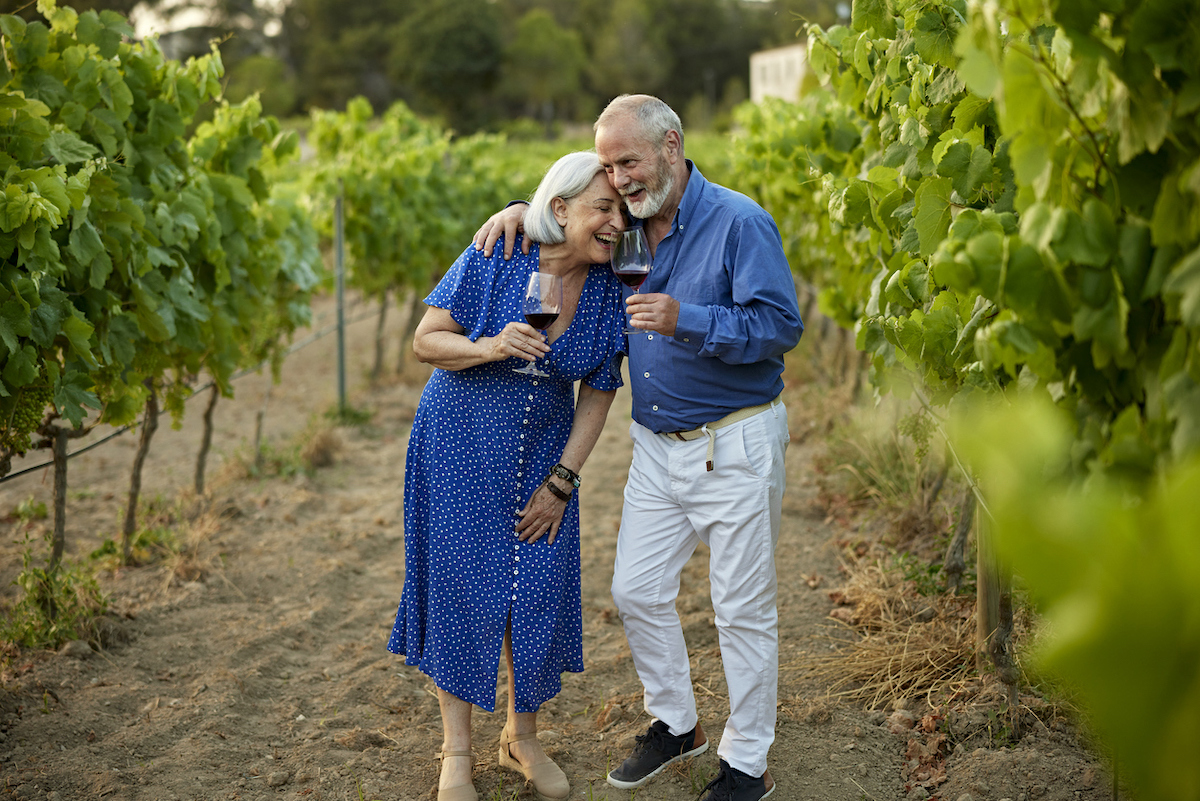8 Things You Should Still Splurge on If You're Retired, Financial Experts Say
Use strategic spending to boost your quality of life with these tips.

When you enter retirement, you may find that your finances have changed dramatically, or that you're now on a fixed budget. Financial experts say that this presents a good opportunity to review your spending and trim the fat for more financial freedom. However, they also note that it's important to balance this prudence with quality of life. Wondering which expenses are still worth the splurge, even after this major financial transition? Read on to learn the eight things you should still spend on after retirement.
RELATED: 10 Things You Should Stop Buying When You Retire, Finance Experts Say.
1
Health insurance and elective procedures

Health is wealth, as the saying goes—and this is an investment with a particularly big payoff.
"In retirement, health is paramount," says Jake Claver, a finance expert and financial director for Digital Ascension Group. "Consider splurging on a premium healthcare plan, regular check-ups, or specialized treatments. They not only enhance your quality of life but can also save you money in the long run by preempting potential health crises."
Ann Martin, director of operations for CreditDonkey, agrees that your health is well worth the investment. "Get that knee surgery even though you can still walk with a cane. Go to physical therapy. Get that Lasik surgery," she shares. "The quality of your retirement depends a lot on just how much you can still do with your body. Don't let the fact that you're getting by keep you from investing in treatments that will improve your quality of life. You've earned it."
RELATED: 25 Best Ways to Save for Retirement.
2
Lifelong learning opportunities

Keeping your mind sharp is just as important as keeping your body healthy. That's why Claver says you should feel free to splurge on lifelong learning opportunities after you've retired.
"Enroll in courses or workshops that pique your interest. Whether it's art, music, or even a new language, these activities stimulate the mind, promote cognitive health, and allow for social engagement, enhancing your golden years," he says.
Karen J. Helfrich, LCSW-C, a psychotherapist, financial educator, and owner of The Avalon Center for Integrative Therapies, agrees that this is money well-spent: "Learning a new language, playing a new instrument, or making art are wonderful ways to exercise our brains and create joy and fulfillment as we age."
RELATED: 9 Major Signs You're Not Ready to Retire, Financial Experts Say.
3
Home upgrades for comfort and safety

While it may be unwise to spend excessively on aesthetic upgrades to your home, any upgrade that increases your comfort and safety is worth the splurge.
"Invest in home improvements like bathroom grab bars, non-slip floors, or a stairlift," says Claver. "These not only boost the resale value of your property but also ensure your environment remains safe and adaptive to your changing needs."
Likewise, Alec Kellzi, CPA, a certified public accountant at IRS Extension Online, recommends putting money toward a trustworthy home security system. "As you age, ensuring your home is safe and secure is essential," he says, noting that these investments will help bring you "peace of mind."
4
Travel

When you were working, you likely had more cash but less time. Now things are reversed: You're living on a retirement budget, but finally have the freedom to see the world. And even though this can be an expensive undertaking, travel is worth the money now that you have the time to do it.
"While budget travel has its perks, splurging on a few luxury or bespoke trips ensures comfort and unique experiences," says Claver. "After years of hard work, it's time to explore the world in style, making memories that last a lifetime."
RELATED: The 50 Best and Worst States to Retire In, New Data Shows.
5
Experiences and entertainment

Of course, you don't have to go far from home to make meaningful memories. Helfrich says that while you should be mindful of your entertainment expenses, it's important to include these experiences in your budget to enhance your quality of life in retirement.
"By making plans and engaging in new experiences, we build new memories and continue to experience meaning in life. Having plans and something to look forward to increases our sense of happiness, purpose, and fulfillment as we age," she tells Best Life.
Helfrich suggests meeting friends for lunch or coffee, making trips to see the grandkids, and finding hobbies you're passionate about. "Spending time and money in connection with loved ones helps us feel supported, connected, and a sense of belonging."
6
Fitness equipment or gym memberships

It's also worth spending some money to remove barriers to physical fitness—especially after you retire.
"Staying active and maintaining your health is vital in retirement," explains Kellzi. "Consider investing in fitness equipment, such as a treadmill, stationary bike, or weights, to make it easier to exercise regularly and maintain your physical well-being," he suggests.
Alternatively, consider spending on a monthly gym membership if a home gym feels like too big an investment.
RELATED: 6 Tax Filing Tips for Retirees, According to Finance Experts.
7
Groceries

An ounce of prevention is worth a pound of cure—and your eating habits are a perfect example. By sticking to healthy whole foods rather than eating cheaper, more processed foods, you can lower your risk of cardiovascular disease, type 2 diabetes, certain types of cancer, and more.
"Investing in quality food, especially fresh fruits and vegetables, is a decision you won't regret," says Johannes Larsson, a personal finance expert and the founder and CEO of Financer.com. "While your grocery bill might see an uptick, the long-term health benefits are substantial. By maintaining a balanced diet, you can potentially reduce medical expenses in the future."
8
Pets

Adopting and caring for a pet can be especially rewarding after you retire—which is why Larsson says it's worth the investment.
"The companionship of a pet is invaluable. While there are costs associated with adoption, vaccinations, and ongoing care, the emotional and health benefits far outweigh them," he notes.
For more retirement tips sent directly to your inbox, sign up for our daily newsletter.





















